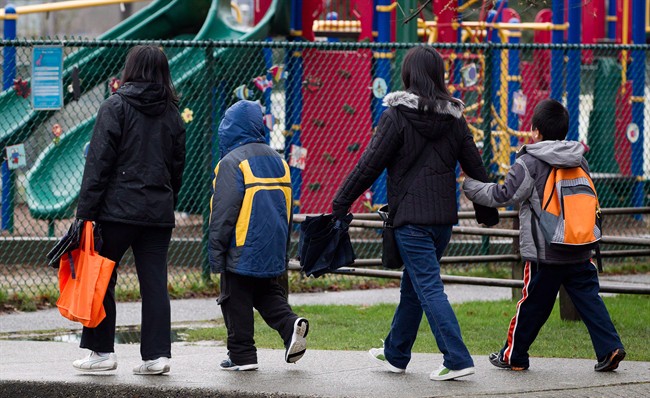TORONTO – Back-to-school-time can be back-to-stress time for kids of all ages. But experts say there are ways to help them cope with the anxiety that can be triggered by the return to the structured environment of the classroom.

Preparing kids for what is coming up, getting them back into a regular sleep routine, reconnecting them with school friends they may not have seen over the summer – these and other techniques will help with the readjustment, they say.
But the most important approach may be just to talk with and listen to children, adolescents and teens about what worries them when they think about the resumption of classes, says David Wolfe, a psychologist and senior scientist at Toronto’s Centre for Addiction and Mental Health.
“And to say ‘I understand it’s tough to go back to school. The more you talk about it, the more you tell me what’s going on, the more I can at least listen and help you if I think I can,”‘ says Wolfe, who works with children and teens.
It’s entirely normal to feel a degree of stress associated with the start of school, experts say.
Young children who are going to school for the first time can be fearful about facing the unknown and worried about being separated during the day from a parent or a trusted caregiver.
Older children who’ve already been in school may dread the return to a regimented world where they have to buckle down to work. “There’s nothing abnormal about going from a low responsibility situation in the summer to a higher one and feeling anxious about it,” Wolfe says.
Teens may be worried about fitting in, at a time of life when fitting in can be all-important – but tough to do.
“You’re under more stress as you go into middle school in particular. More stress because of all of the rapid changes in your development and expectations and sexual stress and so forth,” Wolfe says.
“You start looking at the world in black and white again. I better do this and not that in order to be accepted. … I’ve got to make sure that I’m not picked out as being different. So it’s very stressful.”
He notes that some anxiety is a good thing – it’s part of the intrinsic human wiring, designed to help us survive real threats. “It’s a way of negotiating the world, staying away from certain dangerous objects and that (sort of thing).”
But too much anxiety can be debilitating and a sign something else is at play. A young child may be experiencing separation anxiety – over the loss of constant access to a parent – that makes it hard for him or her to adapt to school. Or a child who is returning to school may have been bullied in the past and may be fearful about having to face a tormentor again.
“It’s always good to ask those questions or just ask ‘Is there anything else you worry about?”‘ Wolfe says.
The Psychology Foundation of Canada suggests starting to prep kids for school at least a week before classes resume. Shopping for new clothes and school supplies, or practising the walk to school can help kids become more comfortable with what is to come.
And others praise so-called mindfulness techniques as a way to help kids young and old to gain control of the anxiety that may be cluttering up their minds.
There are a variety of approaches, but the basic idea is to bring children into the present – as opposed to worrying about the future – as a way of grounding them and helping them calm themselves. Some ways of doing this are to focus on breathing – taking “brain breaks” in the language of the Hawn Foundation (started by actress Goldie Hawn), which has been a leader in bringing mindfulness techniques into schools.
Now New York-based, the foundation was started in Vancouver in the early 2000s; Hawn was living there while her son, Wyatt, played junior B hockey for the Richmond Sockeyes. Its signature program is called MindUP, which teaches children about the brain and why they react to stimuli or stresses the way they do.
Kimberly Schonert-Reichl, a professor of applied developmental psychology in the University of British Columbia’s faculty of education, has studied the impact of MindUP on children. The evidence shows that it and other mindfulness programs help lower kids’ stress levels, she says.
Teachers – 3,000 in B.C. are trained on the MindUP program – find it a good stress reliever too, Schonert-Reichl says.
“Kids tell us all the time ‘Finally, you give me something I can use,”‘ she says.
Schonert-Reichl says one way to use mindfulness techniques to help with the stress of resuming school might be to focus, while walking to school, on all the sounds one hears. Instead of having a head full of anxious or negative thoughts about what the coming day or year might bring, the child can be helped to focus on what he or she is experiencing at that moment.
Wolfe says CAMH’s Fourth R program – the fourth R, after reading, writing and arithmetic, is relationships – incorporates mindfulness strategies.
“It’s a way of just recognizing our normal emotions and be able to deal with them and not let them possess you,” he says of the approach. “All giving the message that you can control this. … It’s a normal feeling, don’t let it take over you. Learn to breathe.”
—
On the Web:
The Hawn Foundation, http://thehawnfoundation.org/
CAMH’s Fourth R program: http://youthrelationships.org/

Comments